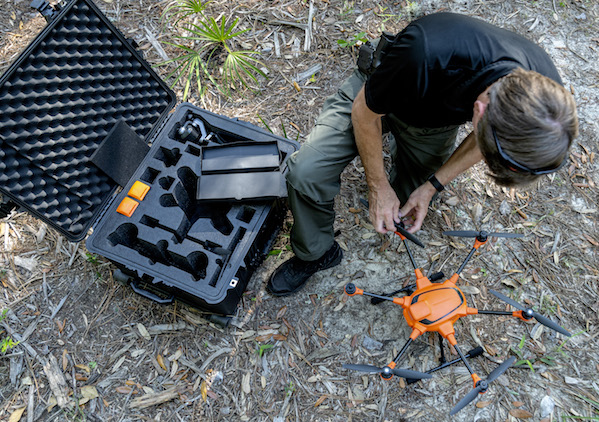Campus police officers at Northwest Florida State College have a new tool to help keep students safe: a drone unit. The unmanned aircraft systems (UAS) will aid in searching for missing people, assessing traffic accidents, photographing crime scenes and mapping evacuation routes.
“If there is a critical incident on our campus, we have a way to get a good overview of what’s going on,” says Michael Traylor, an investigator at the college and the drone unit supervisor. “That kind of situational awareness is important for our first responders.”
Northwest Florida State is among a handful of campuses operating drone units, according to a 2018 report from the Center for the Study of the Drone at Bard College in New York and Washington, D.C.
As the technology improves and costs decrease, more campuses will likely add UAS to their campus security forces, says Eric Plummer, chair of the domestic preparedness committee for the International Association of Campus Law Enforcement Administrators (IACLEA).
Investing in aerial support
“Until drones came along, institutions would have had to invest in helicopters or fixed-wing aircraft to have aerial support, and both are expensive to operate and maintain,” Plummer says.
Northwest Florida State invested an estimated $9,000 to purchase four drones and train officers to pilot the systems. The sole drone unit in the region, it provides opportunities to offer aerial support to local law enforcement agencies as well. The benefits of renting out the drones and the pilots to help with incident response extend to extra revenue that helps support the fledgling program.
The University of North Dakota added a drone unit in 2012. It’s deployed on campus about once every two months, says IACLEA’s Plummer, who is also the associate vice president of public safety and chief of police for the university’s Grand Forks campus.
Plummer cautions administrators about the wide availability of drones. “You can’t just go out to Best Buy and get shiny new equipment. You have to devote the time to keeping up the equipment, skills and knowledge to run the program.”

Developing policies and awareness
Campus police departments must adhere to both Federal Aviation Administration and state regulations for drone certification, pilot licensing and operation. Colleges and universities, Plummer adds, should adopt their own set of policies for on-campus use.
Northwest Florida State officials started talking about adding a drone unit in September 2018. They spent months reviewing requirements, establishing goals and developing drone use policies, which address both on-campus operations and privacy concerns.
Plummer suggests making a presentation during student orientation and posting signs around campus to build awareness that campus police use drones for public safety. Northwest Florida State, for example, created a video to spread the word about its new drone unit. Traylor hopes the high-tech addition to the campus security team will be well received by students and the local community.
“Our goal is to have a well-trained, mission-capable unit that can give us an airborne advantage to resolve situations quickly,” he says. “Anytime technology can protect students and make our campus safer, we want to use it.”





